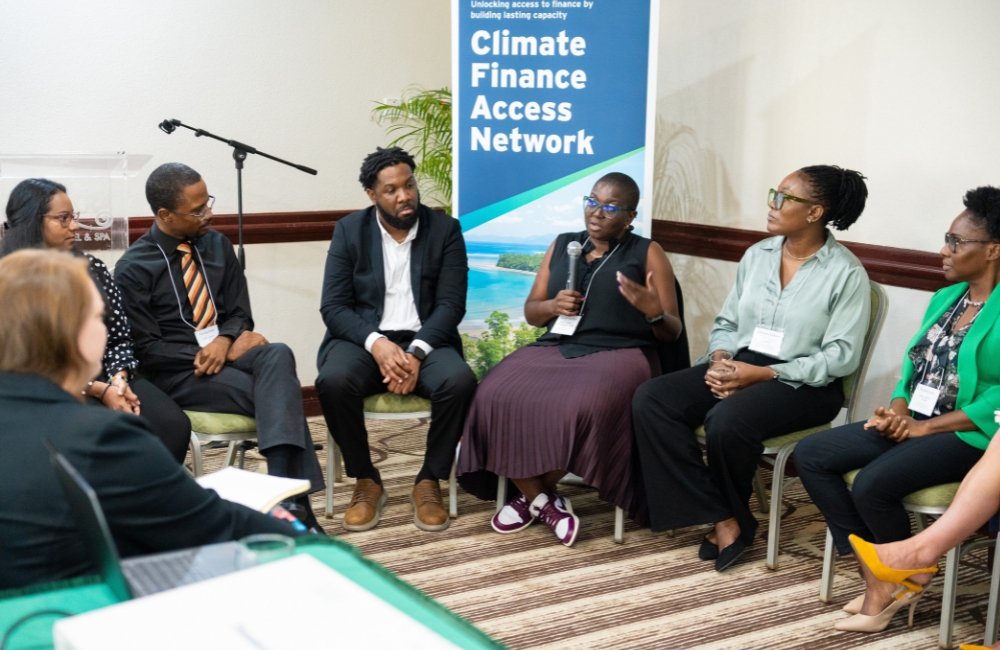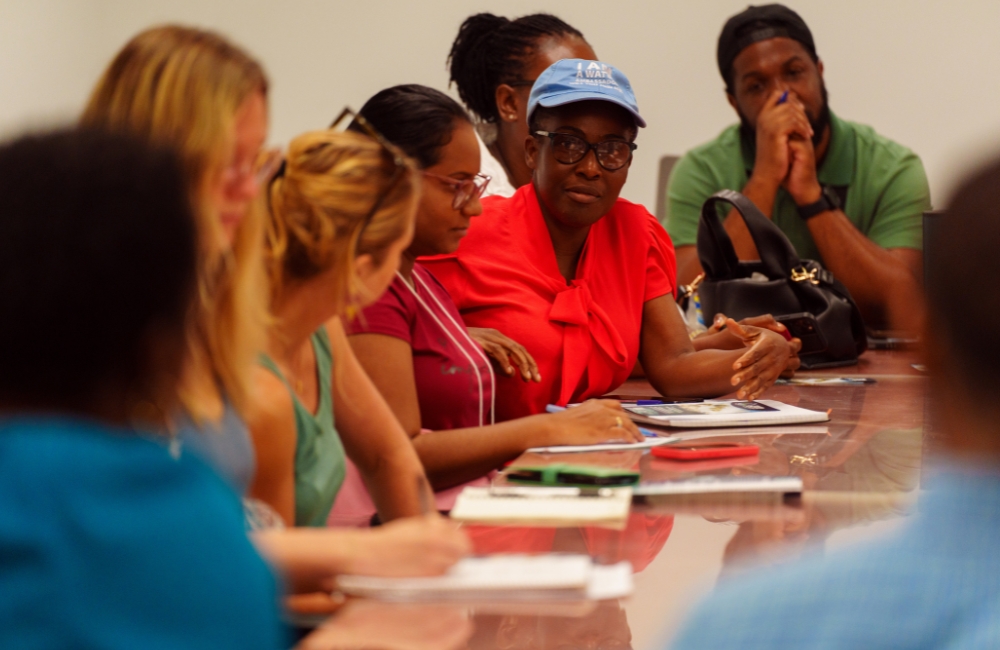Without investment in education, the cost of climate change will not only be financial – it will cost children their futures
Save the Children is collaborating with the Climate Finance Access Network (CFAN) to enable Ministries of Education in the Caribbean to access new funding to make education systems more resilient.
Children’s education is at risk due to extreme weather events like heatwaves and flooding destroying and damaging schools and learning materials, and turning schools into shelters for those displaced. Accelerated by climate change, these shocks can further restrict access to education for children – especially girls – as they often lead to increases in gender-based violence, forced early marriage, and greater domestic responsibilities.
Climate change is increasing these challenges which disrupt children’s right to safety and education. A remarkable one in seven children had their education affected by climate hazards in 2024 alone, with heatwaves being the most disruptive. This is particularly concerning as students are showing lower learning outcomes during hot school years compared to cooler years.
Despite 20 countries facing nation-wide education interruptions in 2024, the education sector is still overlooked in policy discussions, leaving schools ill-prepared to deal with the impacts of climate change on learning.
The Climate Smart Education Systems Initiative: increasing access to climate finance for resilient education systems
Every child should be able to learn in a safe and resilient environment and gain the knowledge and skills they need to adapt to climate-induced shocks and stresses. Investment in climate-resilient education systems empowers children, strengthens societies, and fuels economies – delivering generational impact.
“Education can be a powerful driver for more sustainable development, including a transition to green societies.” – Global Partnership for Education (GPE)
Climate finance is crucial to realise these aims. However, limited awareness of funding mechanisms results in climate finance remaining largely untapped by the education sector, illustrated by only one of 591 projects (0.17%) across four large multilateral climate funds between 2006-2023 prioritizing education as a principal objective.
Already stretched funding for education is being further strained due to the impacts of the climate crisis. This means that if unlocked, large climate funds can provide the education sector with much needed finance to address the sector’s critical adaptation needs.
The Climate-Smart Education Systems Initiative (CSESI), funded by the Global Partnership for Education (GPE), and implemented by Save the Children and UNESCO, aims to address this funding gap and support participating Ministries of Education in accessing new types of finance to enhance the resilience of the education sector. Caribbean Small Island Developing States (SIDS), which face a disproportionate climate change impact and burden, are one of many regions targeted through the Initiative.
By building SIDS’ capacity to identify climate finance opportunities and understand access modalities, CSESI supports Ministries of Education to unlock critical climate finance required to adapt education systems to increasing climate impacts and ensure education continuity for children.
“Climate finance is not optional for the Caribbean’s education sector – it is essential,” says Sandrea Maynard, the Pro Vice-Chancellor Global Affairs at the University of West Indies. “Increasing climate threats demand urgent investment in safe learning spaces, digital infrastructure, and disaster preparedness. At the University of West Indies, we recognise that resilient education is the foundation of a resilient region.”
However, the process for accessing climate finance is lengthy and complex and many SIDS lack the technical and institutional capacity to navigate this system effectively. CFAN was born out of this need for further capacity and expertise. CFAN hires, trains, and embeds skilled climate finance advisors in countries and Direct Access Entities (DAEs) to support the development of bankable project pipelines. Trained through CFAN’s rigorous climate finance curriculum, advisors then train government and DAE colleagues to build lasting capacity at scale.
Expertise in action: workshops bring climate finance to the education sector
Together, Save the Children and CFAN are supporting increased involvement of Ministries of Education in climate projects by enabling them to contribute to the development of bankable climate projects that secure finance for their unique priorities and ensure children’s continued access to education.
In Saint Vincent and the Grenadines and Grenada
In July 2025, representatives from the Ministries of Education in Saint Vincent and the Grenadines (SVG) and Grenada participated in CFAN advisor-led climate finance workshops. Each workshop involved hands-on learning via practical exercises, and sought to build participants’ understanding of key topics, such as the climate finance landscape, sources of climate finance, and funder priorities, investment criteria and project design tools.

“A climate-resilient education system begins with informed leadership,” says CFAN Advisor to SVG, Nyasha Hamilton, (centre, with microphone).
“Inclusion of education officials in climate finance training is essential for effective, cross-sectoral climate action and empowers countries to invest in schools that withstand shocks, adapt to climate change, and fosters a generation ready to lead on climate resilience.”
Critically, both workshops provided space for cross-ministerial collaboration, because limited coordination between ministries can lead to fragmented project proposals and missed opportunities to invest in the education sector. During the workshops, Ministries of Education participated in group exercises and discussions with peers from other ministries, opening the door for cooperation, which was welcomed by all:
“The involvement of various ministries and sectors highlighted the importance and interconnectedness of all stakeholders when it comes to accessing climate financing,” says Alexis Caine, the Deputy Education Planner for Saint Vincent and the Grenadines. “I was pleased to participate in the climate finance workshop, which I found both informative and engaging.”

“True climate resilience is built not in silos, but through collaboration,” says CFAN Advisor to Grenada, Nathale Clarke (centre, in red).
“By connecting education, policy, and technical expertise, we can unlock the full potential of climate finance to create lasting impact for our communities.”
In Jamaica
In Jamaica, CFAN’s experience collaborating with the Ministry of Education and Youth (MOEY) in the development of a project concept note holds valuable lessons for the wider region.
Like all SIDS, Jamaica is highly vulnerable to climate change. In 2024, the Planning Institute of Jamaica identified more than USD$16.6 million in damages to the education sector from Hurricane Beryl alone, which led to prolonged disruptions in schooling, particularly for the most vulnerable children.
Due to the vulnerability of Jamaica’s education sector, CFAN advisor to Jamaica, Shalenie Madho, is working with MOEY to develop a project concept note for the Green Climate Fund. The concept note aims to enhance climate resilience in Jamaica’s education sector through various investments in school infrastructure, energy efficiency and capacity building.
For Shalenie, climate finance plays a critical role in increasing the resilience of Jamaica's education system: “Climate finance is essential for strengthening climate resilience of Jamaica’s education system and school infrastructure,” she says. “[It can] enable both to respond effectively and at scale to climate change impacts, something that national budgets alone often cannot support.”
Despite the clear benefits of investment in the education sector, climate finance remains difficult to access, especially for the MOEY. Shalenie sees this as an opportunity for further training with the resulting skillsets improving quality and coherence of funding proposals, which is critical given the power of climate finance to support a climate resilient future not only for Jamaica’s education sector, but for the country itself.
“Climate finance for the education sector is not just about protecting school buildings, it's about securing the future of our children and communities,” Shalenie says. “Such investment will empower students, educators, technical experts and more with the knowledge and tools to build a sustainable, inclusive nation.”
By Alex Milano (Climate Finance Access Network) and Jessica Cooke (Save the Children Australia).
Photos: Climate Finance Access Network